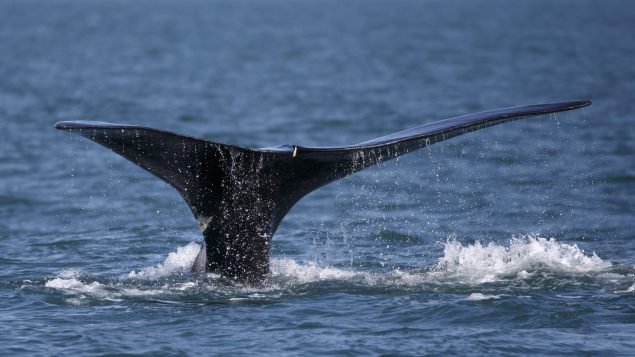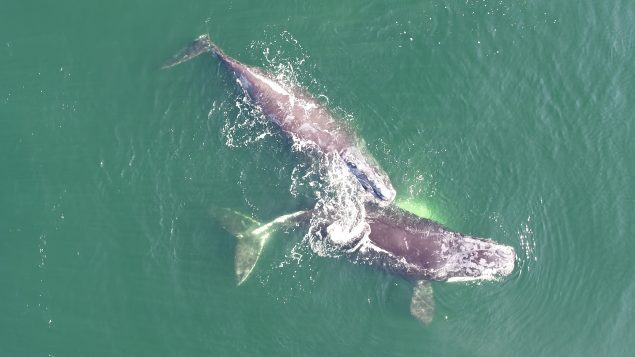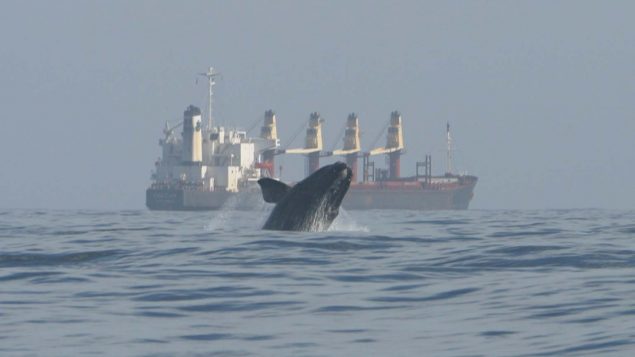A conservation group is calling on the federal government to extend mandatory maritime speed limits designed to protect critically endangered North Atlantic right whales off Canada’s Atlantic coast after analysis of vessel traffic data showed that most captains ignore the voluntary speed limit set by Ottawa.
Oceana says its analysis of satellite data shows that between May 19 and 25, 72 per cent of ships transiting through the Cabot Strait – a key passage for North Atlantic right whales as they migrate into the Gulf of St. Lawrence in search of food – were not complying with the voluntary slowdown of 10 knots.
A Canadian cargo ship was observed moving through the area at speeds over 21 knots, Oceana said.
Kim Elmslie, director of Oceana’s right whale campaign, says that the high rate of non-compliance with the voluntary speed limit “poses a real threat for individual right whales and the survival of the species as a whole.”
“We must do everything we can to protect all right whales and prevent the extinction of this species”, said Elmslie. “Vessels are not complying with the voluntary slowdown in the Cabot Strait; therefore, it must be made mandatory – before it is too late. Each death pushes right whales closer to extinction.”
Transport Minister Marc Garneau could not be reached for comment in time for publication.

In this Wednesday March 28, 2018 photo, a North Atlantic right whale feeds on the surface of Cape Cod bay off the coast of Plymouth, Mass. (Michael Dwyer/THE CANADIAN PRESS/AP)
North Atlantic right whales are one of the world’s most endangered whales, with only around 400 left.
Only ten calves were observed in U.S. waters in 2020. That is well below the 30 calves that would be expected from a population of that size.
One of those calves has already died as a result of a ship strike, U.S. officials believe.
At least 10 right whales were killed last year and there were 22 deaths in Canadian waters between 2017 and 2019.
Studies have found that slowing ship speeds to 10 knots or less in areas where these whales may be encountered can reduce the lethality of a collision by 86 per cent, Oceana said.

A pair of North Atlantic right whales were spotted by surveillance aircraft in the waters of the Gulf of St. Lawrence on May 3, 2020. (Department of Fisheries and Oceans Canada)
A pair of right whales were spotted in the Gulf of St. Lawrence on May 3 by a Fisheries and Oceans Canada (DFO) aircraft that was conducting right whale aerial surveillance.
The sighting triggered fishery closures in Atlantic Canada designed to protect the endangered marine mammals from potentially deadly entanglements in fishing gear.
- Transport Canada fines ship for exceeding whale safety speed limit
- Conservation groups call for additional measures to protect endangered right whales
In an effort to protect the whales, Transport Canada announced in February a voluntary speed limit in the Cabot Strait of 10 knots for vessels that are 13 metres and longer that would take effect from April 28 to June 15 and again from October 1 to November 15, 2020.
Transport Canada also implemented a mandatory speed limit of 10 knots in the western Gulf of St. Lawrence to help prevent vessel collisions with whales.







For reasons beyond our control, and for an undetermined period of time, our comment section is now closed. However, our social networks remain open to your contributions.